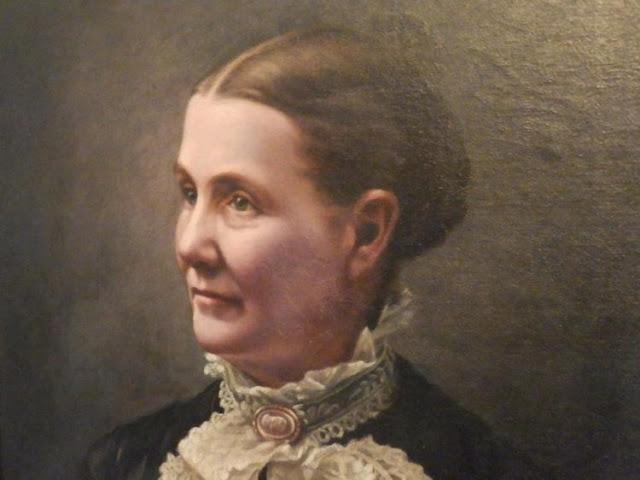 |
| Alice Kirk Grierson |
That Alice Kirk Grierson loved her husband is perfectly clear. The letters she sent him are full of devotion that wasn't simply practiced or platonic. For a woman with her Victorian sensibilities, her passions are as embarrassingly physical as they are evident. That she and her husband were one cannot be doubted.
Her life was not easy. A major general in the Civil War, Benjamin H. Grierson, a hero at Vicksburg, decided to stay in the military after Appomattox and was subsequently assigned to the West, then shuffled, with his family, to often remote forts where sometimes for weeks and months, Alice and the children lived in tents. Grierson saw lots of action in the Indian wars. His command was the Tenth Cavalry, African-Americans, "buffalo soldiers." Grierson was, from early on, an abolitionist.
When Mrs. Grierson's lot brought her to a well-established fort, when she and her children could move out of a tent and into an actual house--some of which were nicely outfitted--she was immediately thrust into playing hostess to visiting brass and their wives, a task she found as wearying as trying to rear her children in the difficult and faraway places she did.
Her letters to her husband sometimes protest a bit at the work his position required--both of him (long absences in frontier lands) and of her (playing high society to officers and their wives)--not to mention being Mom.
And Mom she was. Simply naming the children by their ages would be wearying. Given the major general's frequent absences and the danger his pursuit of renegade Comanches throughout the vast, broiling Southwest, their altogether infrequent time together nonetheless bore abundant fruit. Alice Kirk Grierson had no trouble getting pregnant, and each and every beloved baby only served to increase her workload and pile on other anxieties.
There were already so many children and so much to do that she told her husband in a burdened letter that she couldn't help but fear their reunion again because of what she guessed would inevitably happen.
She tried to explain:
Charlie's existence I accepted as a matter of course, without either joy or sorrow. Kirkie's with regret, for so soon succeeding him. Robert came nearer being welcomed with joy than any other. Edie was gladly welcome so soon as I knew her sex, but I was exceedingly thankful she did not come until the close of the war. Harry succeeded her too soon to give me as much rest as I would have liked, and it was so hard on me to learn to harmonize public life with nursery duties and other family cares, that I used to feel as if I had scarcely natural affection for Harry, and told you before he was a y ear old, that I would rather die, than have another child, yet no sooner was he weaned than Georgie came into life, but I was neither tempted to commit suicide, nor the fearfully frequent National crime of abortion.
Her last two births left her in depression. "When our precious baby died, you said to me, "bear up, darling, she was with us for some purpose." She says she thinks often of those words: "what is the purpose for which she was with us?" The question is not rhetorical.
When she hears news of her mother's illness in faraway Chicago, she determines not to stay any longer in Indian Territory. She must leave Ft. Sill, and when, after a long and grueling stagecoach trip, she arrives at her father's home, she decides, firmly, that it will be some time before she returns to the Major General.
He misses her dearly and tells her so. She knows his loneliness, she says, but she refuses to return and stays through the winter. She will not return when he wants her to for a very simple reason: "My darling husband, I should have gone to my grave if I had not gone to my father's house," she tells him in a letter.
Alice Kirk Grierson is a Christian believer. She abides by what she considered the Bible's directives about being "subject to your husband," of the promise she made to give herself to him when his desires so move. She regards coitus interruptus as unseemly, even a kind of sin. Armed with her faith, she's come to believe the only way she can prevent another pregnancy is by staying away from her husband until she's rebuilt the strength to deal with what she sees as inevitable eventualities--yet another baby.
It's unfair for me to assume my reaction to her story may be the same as anyone else's--in this case specifically, any other men; but I've not been able to forget Mrs. Grier's love letters, for that's what they are, nor the dilemma her situation created for her.
And times have changed. Birth control today is an industry. The Christian faith, even among the most faithful, doesn't make the demands it did of Mrs. Grierson. I don't know that her story adds anything to the debate surrounding what she called 150 years ago the "National crime of abortion."
But her letters and her story teaches me--a man, a husband, and a father--two lessons I can't help take to heart: first, as a male, how very much about the subject I don't know; and second, also as a male, to keep my mouth shut about matters Mrs. Grierson's letters make painfully clear I only dimly understand.
No comments:
Post a Comment